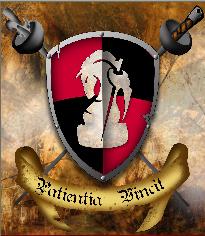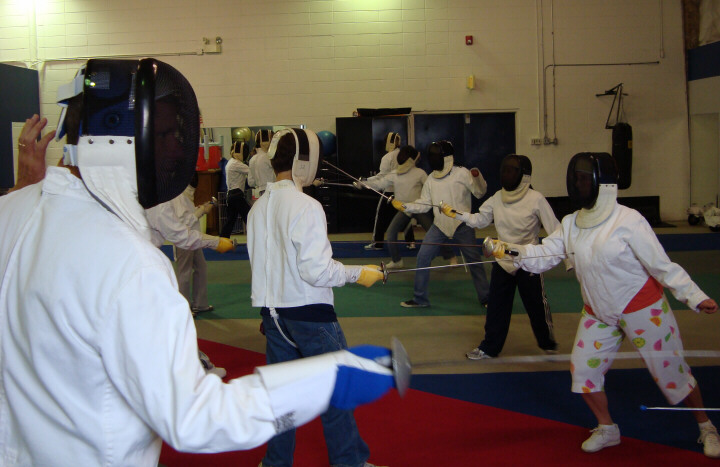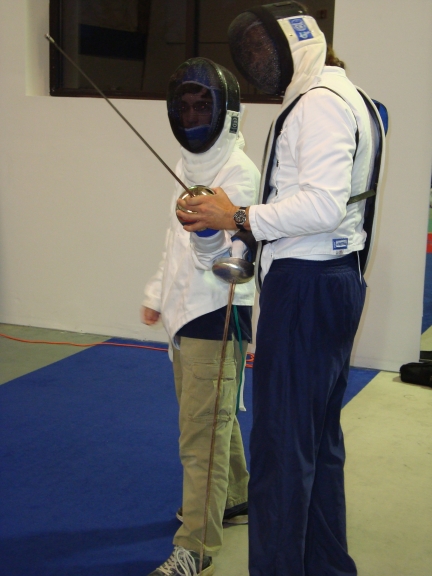

|
Officers and Affiliations The Huntsville Fencing Club was originally established in 1971 as an outgrowth of the M.A.R.S. Fencing Club founded by NASA engineers in 1963. The club has been under its current direction since January 2000. Our officers include co-directors Benerson Little, Mike Greene, and Rob Parks; instructor Benerson Little; secretary-treasurer Rob Parks; and armorer Dave Young. As always, our officers are ably assisted by the rest of the membership. The Huntsville Fencing Club is a member of the USA Fencing, the governing body of modern fencing in the United States. USA Fencing is a member of both the United States Olympic Committee (USOC) and the Federation Internationale d’Escrime (FIE), the international governing body of competitive fencing.
Purpose To provide a local venue for recreational and competitive fencers of all levels at the lowest reasonable cost and free of unnecessary encumbrances; to promote the sport of Olympic fencing at the recreational and competitive levels, especially epee fencing; to maintain the traditions of honorable combat with swords; to encourage the study of swordplay, past and present; to provide affordable quality beginning instruction and individual lessons; to minimize the administrative, logistical, and financial requirements associated with fencing; and, especially, to encourage an atmosphere of competitive camaraderie. The benefits of fencing go far beyond exercise and competition—we consider the historical and swashbuckling connections, the social atmosphere, the lifelong process of learning to fence, and the sheer fun of fencing to be just as important, or more so.
Open Fencing and Membership
We practice at 2319 Bob Wallace Ave. Tuesdays from 7 p.m. to 10 p.m., Fridays from 7 p.m. to 10 p.m., and Saturdays from 12 p.m. to 5 p.m. Visitors are welcome. Please check our club facebook page for recently occurring changes and information: https://www.facebook.com/groups/2220439134/
The 2015 fee schedule is as
follows: For your convenience you can
Pay Online Here
A waiver of liability is required for all members and visiting fencers.
Epee Fencing
Epee, however, has remained more or less unchanged since the advent of electrical scoring some seventy-five years ago, and little changed from epee fencing of a century ago. It is the weapon most similar to the swordplay and conditions of the duel, and is the most “democratic” of the three weapons, in that the weaker fencer always stands a better chance of winning against a stronger fencer than in foil and saber. Epee also permits a wide variety of styles and has the largest body of technique, even though many epeeists keep their game simple. All of the forgoing has led to epee become the most popular of the three weapons. The old belief among many fencing instructors that epeeists must be tall has been repeatedly disproved, including at the Olympics and World Championships.
Instruction in General We offer group instruction in beginning fencing, as well as individual instruction in epee primarily, although foil and saber lessons are also available. We also occasionally run clinics in footwork, technique, tactics, and weapon repair, and for diversion we occasionally offer clinics in historical fencing, specifically the smallsword and backsword/broadsword/saber/cutlass. Students may begin learning to fence at almost any age, and we have had many students begin in their forties, fifties, and sixties. However, we seldom instruct students under the age of twelve, as fencing does require a minimum level of physical and psychological development, and most youth under twelve, no matter how bright, athletic, or enthusiastic, do not meet this requirement. We do not want to see a young student’s enthusiasm diminish in the face of the physical and mental discipline fencing requires. As long as the student is reasonably able, we have no upper age limit. We do not offer individual instruction to beginners with no fencing experience. Instead, we require that all students who have never fenced before first take a thorough beginning class. Only then will we offer the student individual lessons. Regarding instruction to members of other fencing clubs, see the “Open Fencing and Membership” section above. The club instructors and co-directors are Benerson Little, Mike Greene, and Rob Parks. Beginning class instruction and most individual lessons are provided by Benerson Little. Ben has been fencing for thirty-five years and teaching fencing for fifteen. He originally studied under world-class Hungarian fencers and masters Dr. Francis Zold and Dr. Eugene Hamori (see Links Page), and is mentored as an instructor by Dr. Hamori. Although Ben has had instruction in all three weapons and has competed in all as well, he is primarily an epee fencer, with a strong associated background in what today is considered modern classical foil. Ben is a Professional Member of USA Fencing, a longtime student of fencing history and theory, and also trains in and instructs various historical swordplay. Outside of fencing, he is a historian, maritime analyst, published author, historical consultant to the film and television industry, and former Navy SEAL. Mike has been fencing for twenty five years and has been involved with the Huntsville Fencing Club in some administrative capacity for nearly as long. Mike is also a student of fencing history and club historian.
For Parents A polite word of warning, to parents especially: if you are looking for a club where hand-holding is the norm, this is not the place for you. Although we offer thorough instruction and are always willing to assist fencers, we have neither the time nor the philosophical inclination to engage in excessive hand-holding of fencers or, for that matter, their parents. Club members of any age must be self-motivated. They alone are responsible for attending fencing sessions, engaging in free fencing, seeking out instruction if they want it, and, if they choose, attending competitions. Over-attention,
while it obviously makes good business sense for some clubs, is ultimately
counter-productive. It wrongly teaches fencers to rely on their instructors
rather than upon themselves, thus denying them the greatest lesson that
fencing teaches, that of self-reliance under pressure. The traditions and
forms of modern fencing originated with the 19th century duel, in which
adversaries had to rely solely on themselves while engaged in combat. We
strongly believe in and encourage the values of self-reliance and
self-motivation. The Beginning Fencing Class
Beginning Fencing is an eight session class (sixteen total hours of
instruction) designed to provide the beginner with practical ability in the
basic skills necessary for free fencing. Course material is based largely on
classical foil technique suited to epee and on epee technique itself. Safety
is emphasized. The course also provides the novice fencer with a working
knowledge of the traditions, courtesies, and rules of fencing followed
worldwide. Fencing is physical, psychological, and intellectual, and no
other sport has a history as rich and colorful. We mix youth and adult fencers in the same class; we do not run separate youth classes. As noted above, students must be twelve years or older, although we can make exceptions for students as young as ten years old. The decision is the instructor’s. Course dates are posted on this website at least two weeks in advance, and are often determined only two to four weeks prior to the start date. We typically run three beginning courses per year, although we may run as many as five or as few as two. Course dates are determined by the instructor's schedule. Classes run on Saturdays, noon to 2 p.m. Pre-registration is not required, but please contact us in advance so we have a rough idea of likely class size. The class will require a USA Fencing membership of $10, to maintain our insurance coverage. The class fee amount will be announced at class time. Students are not required to join the HFC during the class, nor pay floor fees.
Individual Instruction We also offer individual lessons in epee, foil (classical and modern), and Hungarian saber, although epee lessons overwhelmingly predominate. Lessons are usually available Fridays from 6 p.m. to 8 p.m., and on Saturday from 2 p.m. to 4 p.m., subject to the instructor’s availability. Our goal is to promote the sport of fencing, thus our rates ($7 per 20 minute lesson) are very reasonable; we are not a business. The instructor determines the lesson order among students and makes no distinction between competitors and purely recreational fencers. This ensures that all fencers who want lessons have an equal opportunity to get them. The instructor does not offer “private” lessons—that is, lessons not associated with his duties as instructor at the HFC—to students at any level. All students must be members of the HFC.
Clinics We occasionally hold periodic clinics (1) for former fencers who wish to begin fencing again but are perhaps too rusty to jump right back in, (2) for current fencers who desire additional instruction in footwork, technique, or tactics, and (3) for those who wish to learn more about weapon repair and care. Clinic dates are determined as required, and typically consist of one or two two-hour sessions on consecutive Saturdays.
Historical Fencing On occasion we run two-hour instructional clinics in historical fencing, primarily in the smallsword and broadsword/backsword/saber/cutlass.
Demonstrations
Inquiries If you are interested in taking classes, arranging for lessons, attending a clinic, or scheduling a demonstration, use the email address on the Contact Us page and we'll gladly get back to you with the required information. Please understand that our officers have lives outside of fencing and may not be able to get back to you immediately. If you do not hear from us within a week at most, please re-send your email. On occasion, emails get mis-routed or our contact person may be unavailable for short periods.
Directions
|
||
|
Copyright © 2004 Huntsville
Fencing Club. All rights reserved. |

